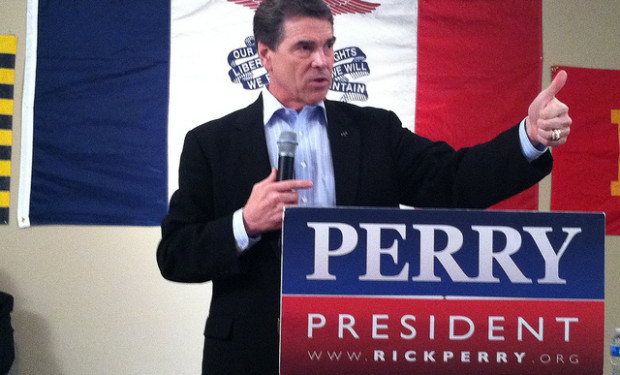Could a trial keep Rick Perry off the campaign trail?
The Texas Governor and 2016 presidential hopeful is seeking to avoid trial at all costs.
This article is the second in a three-part series following the progress of Governor Perry’s case and addressing its potential effects. You can read Part One and Part Two here.
Despite the recent charges filed against him, Texas Governor Rick Perry and his team of advisors are quietly laying the foundation for a 2016 presidential campaign. 2016 may seem far away to most people, but for any presidential hopefuls, the work has already begun. In Perry’s case, this timeline creates an interesting environment for creative litigation.
The issue for the governor is whether the judicial process can be wrapped up quickly and efficiently. Perry has already filed a motion to dismiss, and on Monday, September 8, he filed an additional motion to quash and dismiss. “I expect there will be other motions filed before any trial occurs,” said Tony Buzbee, Perry’s lead attorney in the case.
In his motion to quash and dismiss, Perry argues that sections 39.02(a)(2) and 36.03(a)(1) of the Texas Penal Code are unconstitutional because they attempt to criminalize a constitutionally authorized veto. He further asserts that the statutes are unconstitutionally vague due to their “prohibition of ‘misuse’ of ‘government property . . . that has come into the [Governor’s] custody or possession.’” The motion promotes the gubernatorial veto power, stating that its criminalization would lead to a violation of the constitutional separation of powers. Allowing the judiciary to investigate gubernatorial vetoes would leave the executive branch unable to effectively exercise its constitutionally assigned powers, Perry argues.
The motion also contends that section 36.03(a)(1) is unconstitutional as applied because it creates a limitation to the governor’s lawful ability to coerce through the use of his veto power. “This attempt to criminalize the political process should not be tolerated by this Court or any Texas court,” Perry’s legal team stated. “Otherwise, overzealous prosecutors will be given free reign (sic) to use the grand jury process to chill political decisions by Texas’ Governors.”
As their motions evince, Perry and his team wish to avoid trial at all costs. A trial would likely spell disaster for the governor. Not only would a trial take him away from the presidential campaign trail, but more importantly, it would require Perry to face discovery. Imagine the political ramifications if, a year before he officially launches his presidential campaign, Perry is forced to release emails, correspondences, and other documents. The amount of dirt that would inevitably be uncovered would likely be enough to bury both Perry’s presidential hopes as well as his political reputation.






